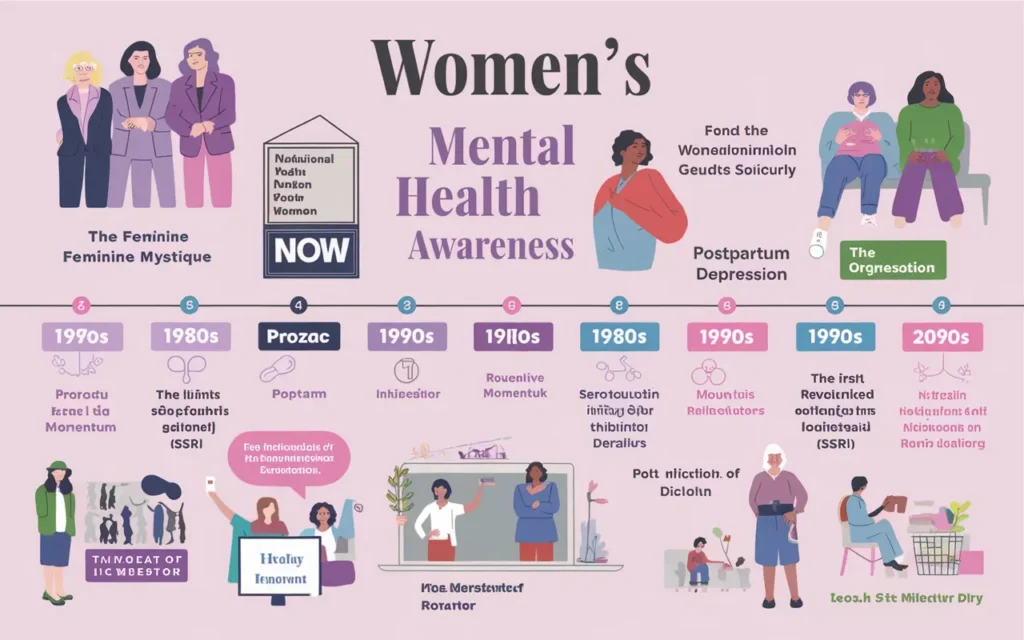Women’s Mental Health Awareness Month: Understanding, Support, and Advocacy
Table of Contents
- Introduction
- The History of Women’s Mental Health Awareness Month
- Importance of Women’s Mental Health Awareness
- Common Mental Health Issues Faced by Women
- Causes and Risk Factors
- Support and Resources
- Advocacy and Education
- How to Get Involved
- Conclusion
- References
Introduction
Women’s Mental Health Awareness Month is a dedicated time to shine a light on the unique mental health challenges that women face. This month serves as an opportunity to educate the general public, reduce stigma, and promote resources and support systems tailored specifically to women’s mental well-being.
The History of Women’s Mental Health Awareness Month

The concept of dedicating specific times to mental health awareness has evolved over the years. While there isn’t an officially designated national month solely for women’s mental health, various initiatives and organizations emphasize women’s mental health during broader mental health awareness campaigns, particularly in May.
Historically, the recognition of women’s mental health has been intertwined with movements for women’s rights and gender equality. As society progresses, the need to address and support women’s mental health continues to gain prominence, leading to increased advocacy and dedicated resources.
Importance of Women’s Mental Health Awareness
Focusing on women’s mental health is crucial for several reasons:
- Unique Challenges: Women often face distinct mental health challenges, including hormonal fluctuations, postpartum depression, and higher rates of anxiety and depression.
- Stigma Reduction: Raising awareness helps reduce the stigma associated with mental health issues, encouraging more women to seek help.
- Support Systems: Awareness leads to better support systems, both socially and medically, tailored to women’s needs.
- Policy Advocacy: Increased awareness can drive policy changes that improve access to mental health services for women.
Common Mental Health Issues Faced by Women
Women are more likely to experience certain mental health conditions compared to men. Some of the most prevalent include:
- Depression: Women are diagnosed with depression at nearly twice the rate of men. Factors include hormonal changes, societal pressures, and higher rates of trauma and abuse.
- Anxiety Disorders: Women are more prone to anxiety disorders, including generalized anxiety disorder, panic disorder, and phobias.
- Postpartum Depression: A significant number of women experience depression after childbirth, affecting both the mother and the child.
- Eating Disorders: Conditions like anorexia, bulimia, and binge-eating disorder are more common in women.
- PTSD: Women are more likely to develop post-traumatic stress disorder, often due to higher exposure to certain types of trauma.
Causes and Risk Factors
Understanding the causes and risk factors of mental health issues in women is essential for prevention and treatment:
Biological Factors
- Hormonal Changes: Fluctuations during menstrual cycles, pregnancy, and menopause can impact mood and mental health.
- Genetics: A family history of mental illness can increase the risk.
Psychological Factors
- Trauma and Abuse: Experiences of physical, emotional, or sexual abuse can lead to long-term mental health issues.
- Stress: Chronic stress from work, relationships, or caregiving roles can contribute to mental health problems.
Social and Environmental Factors
- Societal Pressures: Expectations related to beauty, success, and motherhood can create significant stress.
- Economic Inequality: Financial stress and lack of access to resources can exacerbate mental health issues.
Support and Resources
There are numerous resources available to support women’s mental health:
- Therapy and Counseling: Professional mental health services can provide individualized support.
- Support Groups: Connecting with others who share similar experiences can be empowering and comforting.
- Hotlines: Crisis hotlines offer immediate support for those in distress.
- Online Resources: Websites and forums provide information, tools, and community support.
Additionally, organizations like Montare Behavioral Health and Contigo offer specialized programs and resources tailored to women’s mental health needs.
Advocacy and Education
Advocacy plays a crucial role in advancing women’s mental health awareness:
- Raising Awareness: Campaigns and events help bring attention to the unique mental health challenges women face.
- Policy Change: Advocates work to influence policies that improve access to mental health services for women.
- Education: Educating the public about women’s mental health promotes understanding and reduces stigma.
Educational initiatives during Women’s Mental Health Awareness Month focus on providing accurate information and resources to empower women to take charge of their mental well-being.
How to Get Involved
There are several ways you can contribute to Women’s Mental Health Awareness Month:
- Participate in Events: Attend webinars, workshops, and community events focused on women’s mental health.
- Volunteer: Offer your time and skills to organizations that support women’s mental health.
- Donate: Financial contributions can help fund vital mental health services and research.
- Spread the Word: Use social media and other platforms to share information and raise awareness.
- Advocate: Support policies and initiatives that aim to improve mental health resources for women.
By getting involved, you can help create a supportive environment that prioritizes women’s mental health and well-being.
Conclusion
Women’s Mental Health Awareness Month serves as a critical reminder of the importance of addressing the unique mental health challenges women face. By raising awareness, providing support, and advocating for better resources, we can work towards a society where every woman has the opportunity to achieve optimal mental well-being.
Whether you’re seeking help or looking to support others, remember that mental health is a vital component of overall health. Let’s commit to breaking the stigma and fostering a community that values and supports women’s mental health.
References
- Montare Behavioral Health – Women’s Mental Health Awareness
- Contigo – Women’s Mental Health Awareness Initiative
- SAMHSA – Mental Health Awareness Month
- National Institute of Mental Health – Mental Health Awareness Month
- Women’s Health – National Women’s Health Week